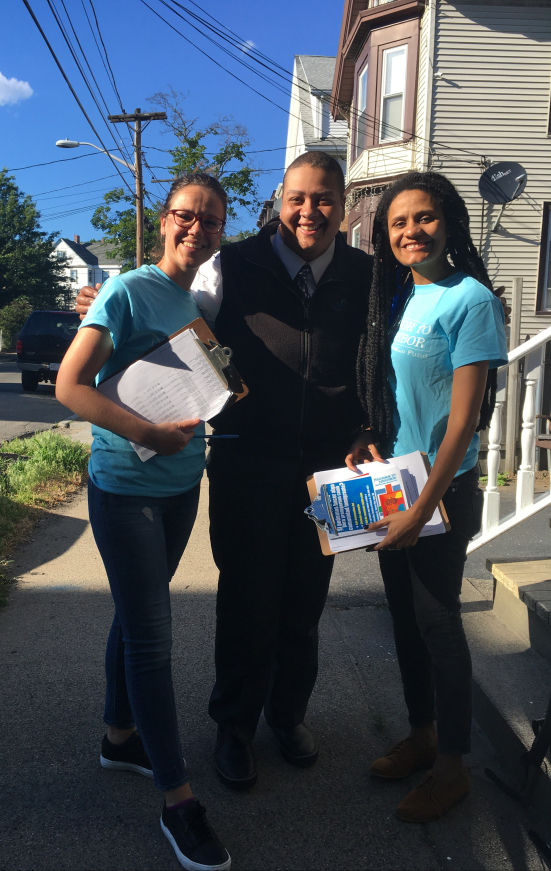Each summer, two Tufts UEP graduate students work with community partners for a 10-week fellowship through the CoRE (Co-learning/Co-education) partnership. Funded by Tisch College, fellows get hands-on experience in community planning, organizing and development while helping to extend the collaborative work between the Tufts and the community partner. Below, Minnie McMahon reflects on her summer 2017 experience with Neighbor to Neighbor Massachusetts. Next week, we’ll share Sharon Cho’s experiences with the Dudley Street Neighborhood Initiative.

Minnie (left) door knocking with Neighbor to Neighbor organizers in Lynn
On my first day at N2N Lynn, the Lynn lead organizer, Estrella Diaz, and Executive Director, Maria Elena Letona, greeted me with a work plan with three projects aimed at supporting N2N’s campaign against displacement. Having a work plan with clear goals and measures put my mind at ease. My fears about being an outsider temporarily placed in a community, and therefore unlikely to do any work of substance, were allayed. Estrella and Maria Elena welcomed me into N2N, and made it clear that, while I had a lot expected of me, I wouldn’t be doing it alone.
During my internship, I organized 30 door-knocking shifts, co-organized a community forum on development and displacement, and conducted research on other communities’ efforts to prevent gentrification-fueled displacement. By the end of the summer, we had knocked on many doors, generating a long list of contacts with which to build up long-term campaign work; held an informational community forum with decent (but not high) turnout; and gathered information on other groups’ anti-displacement struggles.
As I focused on research and door-knocking with members, others worked on electoral politics for the upcoming City Council and Mayoral elections. (As an organization with 501 (c)3 and 501 (c)4 status, N2N can engage in community and in political work.) As a result, I was able to observe the endorsement process. I learned not only how it works and why it’s done, but was privy to the strategizing and process around who to endorse and why.
Lessons Learned
This summer, I was exposed to a lot of ideas, and to the actions tied to those ideas. Some key takeaways for me have to do with the role and the power of the nonprofit; of door-knocking as a method of organizing; and engaging in local electoral politics.
Role of the non-profit
I entered the summer excited about the unequivocal radical message and mission of N2N, but also with a critical eye toward the role of the non-profit in transforming society. At N2N, I experienced the challenge of organizing the broader public, but also N2N membership, itself.
This is because our target constituents in Lynn, and most current members, are highly impacted by the increasing cost of living and lack of good jobs. As a result, some people are already stretched thin, and while their hearts and minds may be behind N2N’s work, they are limited in their ability to show up for certain tasks. For example, many people work nights and weekends, have childcare needs, and/or are working to keep their homes.
In this context, the non-profit is able to provide leadership, to help set an agenda, to prioritize goals, and to set and organize the tasks associated with meeting those goals. N2N requires deep training and political education of its staff, and only hires organizers who are from the community where they organize. This ensures that leadership is very skilled, and is attuned to the needs of the wider community.
Role and power of door-knocking
In order to base-build and raise awareness around the issue of development-fueled displacement, I found myself knocking doors or making phone calls (on rainy days) two or three times a week. This is an energizing and exhausting experience! I learned that it’s typical to have a response rate of 10-20% in the wards we canvassed. Often times, people are not home, have moved, or simply didn’t show much interest in showing up to our community forum. Still, as the weeks marched on and turfs were knocked, we collected many names and phones numbers of people eager to be engaged with the housing issue. Step-by-step, we built up a robust list of Lynn residents with a stake in the issue.
Talking to people on their own stoop or in their living room about their experience, how they think about their experience, and then tying it to the larger political issue is the most basic and essential form of political participation I know.
Role and power of local electoral politics
While electoral politics in America have always been deeply problematic (and nominally democratic), I learned at N2N that getting local political representation inside City Hall is one important tool in a larger toolbox to craft political and material change. During my first week at N2N, the organization held a statewide member assembly where I met, among N2N’s membership, 2 elected officials and a handful of others running for local office. When pushing for CORI reform or inclusionary zoning, it’s necessary to have advocates with voting power to tip the scales in favor of more progressive politics. While this approach feels like a bitter pill to swallow, I am inspired by the candidates and the successfully elected N2N members who are courageously entering the mainstream political arena.
I am now staying on at N2N, one day a week. My work includes wrapping up the summer research into a useable package that includes a narrative about our ongoing campaign. We’d like anyone from inside or outside the community to look at our packet and be able to learn something about political strategies and policy tools to fight displacement. We also think our narrative can serve others as they consider their own strategies to defend their communities against political and economic disenfranchisement.
Pingback: CoRE Summer Fellows 2017: Sharon Cho, Dudley Street Neighborhood Initiative – Practical Visionaries
Comments are closed.